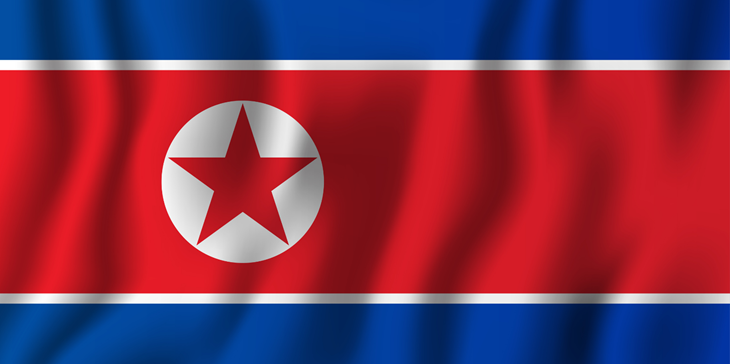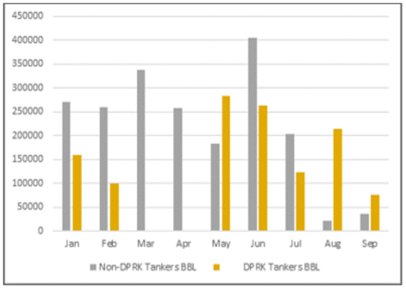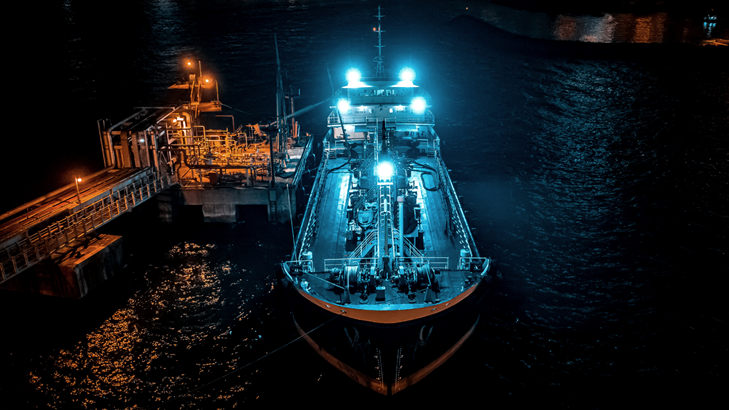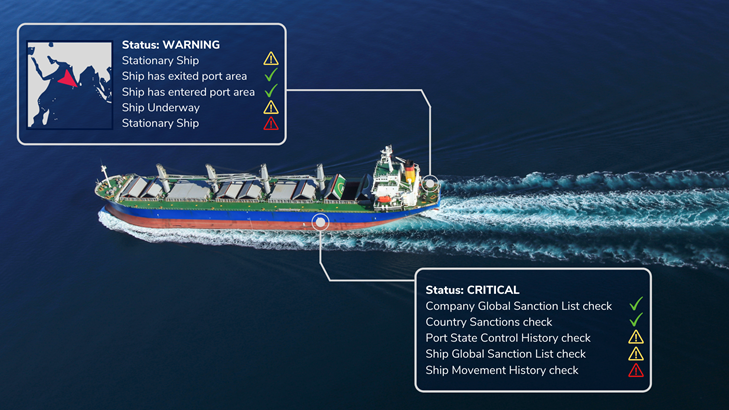Following recent meetings and reports on the North Korea (Democratic People’s Republic of Korea, DPRK) sanctions regime, it remains clear that global maritime supply chains continue to be exploited to sustain the DPRK’s illicit importation and exportation of goods.

The overall aim of the sanctions regime is to achieve peace across the Korean peninsula through the denuclearisation of the DPRK. And, with the DPRK depending on the seas for the majority of its licit and illicit import and export of goods, including those for its ballistic missile programmes, maritime sanctions are critical to achieving this. However, recent findings, including those from the United Nations’ DPRK Panel of Experts report, state that the DPRK has increased efforts to hide its illicit activities and maritime sanctions evasion efforts.
Over the past 18 months, global regulatory bodies have cracked down on sanctions enforcement, releasing guidance to the wider maritime industry on preventing sanctions violations and remaining compliant. In particular, advisories from OFAC and OFSI have comprehensively expanded the regulatory focus, placing all maritime industry stakeholders under the microscope. Now, no company is too big to fail, with the spotlight on ship owners, operators, charterers, flag registries, port state control authorities, classification societies, financial institutions, commodities traders, suppliers, brokerers, and all other shipping industry associations.
However, the DPRK’s sanctions evasion techniques continue, particularly for the acquisition of oil and petroleum products, requiring an assessment of the regime and further action to be taken. Consequently, national representatives have highlighted a key challenge; the industry’s lack of understanding about the importance of compliance with DPRK sanctions and a lack of awareness from implementing agencies and private sector actors of their sanctions obligations.
UN PoE Report Findings 2021
The recent UN Panel of Experts Report on the DPRK covers investigations of the country’s activities throughout 2020. According to the report, there is strong evidence that the DPRK has continued its nuclear programme, while also developing and modernising its ballistic missile programme. As a consequence, the DPRK continues to engage in activities that are prohibited under and evade various UN Security Council resolutions.
The PoE’s findings conclude that within the first 9 months of 2020, 121 shipments of refined petroleum were delivered to DPRK tankers, resulting in illicit shipments of refined petroleum exceeding the annual cap of 500,000 barrels several times over the course of the year. It was also found that further sanctions were breached as the DPRK exported at least 2.5 million tonnes of coal between January and September 2020, in at least 400 shipments to Chinese territorial waters. It is clear that the DPRK and its associates are not just breaching sanctions on the odd occasion, this behaviour is a systematic exploitation of the maritime industry and its regulatory vulnerabilities.
Such results highlight weaknesses within the global supply chain, as individuals, companies, and corporate service providers continue to facilitate, both knowingly and unknowingly, the sanctions evasion activities of the DPRK. With the illicit revenue generated from sanctions evasion activities and laundered through networks like shell companies, both directly and indirectly supporting the DPRK’s weapons of mass destruction and ballistic missile programmes, greater due diligence is advised across the board.

Calculated monthly refined petroleum imports by vessel type.
The PoE’s have assessed that a substantial increase in DPRK tankers illicitly carrying refined petroleum in 2020 is due to the acquisition of new, larger foreign-flagged vessels, of which almost all have unaccounted for AIS transmission gaps during the periods under investigation. As such, substantive weaknesses are apparent in due diligence processes throughout the maritime supply chain, with many obvious deceptive shipping practices overlooked.
For example, when an STS transfer occurs, accurate and up-to-date ship documentation, such as Bills of Lading, are required, yet the report provides examples where this has not been the case. The panel thus recommend that, when a legal STS transfer is planned, those involved should notify the flag registry beforehand, providing details including ship identifiers of the vessels involved, the material and volume of transfer, date, time, and location, in order to mitigate raising unnecessary suspicions.
In conjunction with this, the report finds significant developments in the sophistication of vessels that have conducted sanctionable activities and assumed the identities of other vessels. To prevent detection such vessels disguise their origin by swapping identities using fraudulent profiles, physical modification, AIS manipulation, and transmitting other vessels’ maritime mobile service identity (MMSI) numbers associated with other flags. Techniques like this create inconsistencies when viewing AIS tracks, emphasising the need for improved due diligence processes and multi-source tracking technology.
Throughout the report, it is reiterated that a combination of effective due diligence measures and controls are required for ship owners and relevant counterparties to prevent the risk of their involvement in sanctionable activities. It is only through enhanced vessel screening and refined sanctions compliance programmes that the implications of the DPRK’s sanctions violations on a global and individual level can be minimised.
Current obligations
The current Maritime Provisions of DPRK UN Security Council Resolutions (UNSCRs) cover key areas that Member States are already enforcing to prevent and deter individuals and companies from assisting with the procurement of goods for the DPRK’s sanctioned programmes, including:
- Prohibition of bunkering services to DPRK vessels.
- Inspection of all cargo to or from, or transported by the DPRK.
- Prohibition of leasing or chartering DPRK flagged or related vessels.
- Prohibition of registering vessels to the DPRK flag, or insuring DPRK-flagged vessels.
- Prohibition of port entry for vessels owned or controlled by designated individuals or entities containing prohibited cargo.
- Prohibition of ship-to-ship (STS) transfers to or from DPRK-flagged vessels, and of any goods to or from the DPRK.
- Prohibition of illicit exports of coal and other prohibited items, and imports of refined petroleum products.
- Investigations into deceptive maritime practices. Member States seize, inspect, and freeze any vessel in their ports or territorial waters involved in prohibited activities. These practices include AIS manipulation or disablement, flag hopping, vessel disguise or change of physical identity, complex ship ownership, falsification of cargo documentation, concealment of cargo to deceive physical inspections, STS transfers, and the use of front companies.

A global strategy
Going forwards, government bodies are refocusing their national approaches on sanctions enforcement. Alongside utilising channels of information sharing to increase understanding across the whole supply chain, there will be a crackdown on identifying those utilising sanctions evasion techniques, including deceptive shipping practices. With country representatives worldwide having confirmed their commitment to this, the following key measures are being taken to strengthen the cooperation and communication needed for effective implementation.
Interagency coordination: The promotion of information sharing to ensure that every player understands the implications of sanctions violations and what red flags to look out for.
Engagement with the private sector: Spreading awareness regarding due diligence and good practice across the maritime trade and shipping industries to create a chain of compliance.
National advisories: Governing bodies will distribute guidance to relevant industries, including watch lists, simplified UN resolutions, and measures that the private sector can take.
Revisions of national law: The adoption of UN resolutions into national law, allowing for the criminalisation of sanctions violations and evasion.
Prevention of flag hopping: Creating deterrents for flag hopping by utilising technologies that can assist flag registries with vessel identification, compliance checks, and vessel monitoring.
Military involvement in STS transfers: Where necessary, military assets may be deployed to monitor and deter illegal STS transfers at sea.
Doing your part
Strengthening the chain of compliance throughout the whole maritime trade and shipping industry is a challenge that requires due diligence at all levels, governmental and private included. Not only are legal frameworks in place, but flag registries, customs, export control, port state control, commodity traders, insurers, banks, company registries, classification societies, and more will need to cooperate to ensure that every individual or company they deal with is compliant too.
Therefore, the first step to ultimately denuclearising the DPRK and ensuring peace across the Korean peninsula is ensuring that you have a comprehensive compliance and auditable due diligence programme in place. For those with exposures in maritime trade and shipping, a comprehensive KYC procedure that includes continuous vessel monitoring and screening is essential.
Basic screening is no longer sufficient. To remain compliant and mitigate risk you must regularly screen a vessel’s trading patterns, ownership and management, along with all associated parties, and countries of origin, domicile, and control. In addition, minimising AIS reporting gaps, or ships “going dark”, is critical to understanding a vessel’s movements and identifying illicit activity.
Global regulatory bodies, including OFAC, have made it clear that feigning ignorance is no longer an excuse. No one is safe. No exceptions. However, by demonstrating that you have a sanctions compliance program in place using an audit trail of your best efforts, you will be favourably considered, should you find yourself up against regulators. As such, practicing compliance can ultimately ensure operational continuity in the case of an investigation.

How Pole Star can help
At Pole Star we develop solutions to keep you at the forefront of maritime insight. Designed with and for companies with exposures in maritime trade and shipping our regulatory technology, PurpleTRAC, enables the automation, streamlining, and recording of regulatory processes within a user’s sanctions compliance program. Users can configure their own unique risk parameters to generate accurate results in seconds and produce an incorruptible report for audit.
Performing a sufficient vessel investigation with PurpleTRAC
Check ship details: View a ship’s characteristics and particulars, and screen the ownership and management against global, country, and company sanctions lists.
Track vessel location continuously: Utilise persistent tracking provided by the aggregation of Inmarsat or Iridium positional data with AIS, creating a multi-source tracking solution that works even when the AIS is unavailable.
Analyse non-reporting AIS gaps: Check AIS reporting gaps for frequency, high-risk locations, draught change, and suspicious vessels in close proximity.
Monitor high-risk areas: Investigate vessels in high-risk transshipment areas and regulatory zones for a full picture of vessels in relation to areas of interest.
Learn more about PurpleTRAC here or request a demo via [email protected].
For additional information on North Korea’s oil procurement networks, read RUSI’s recent Project Sandstone report here.